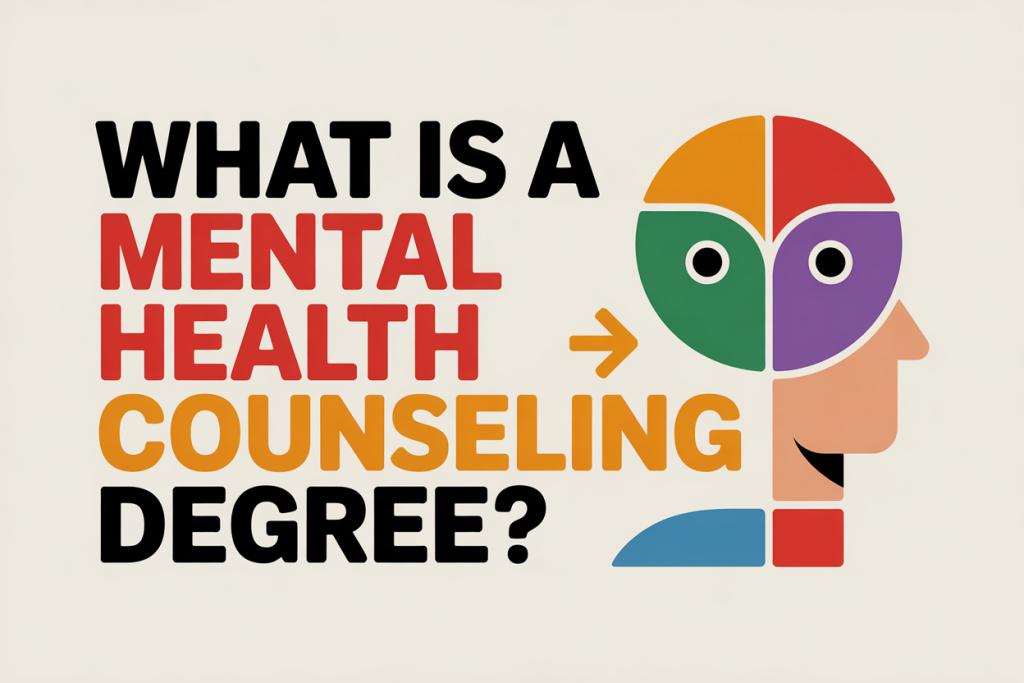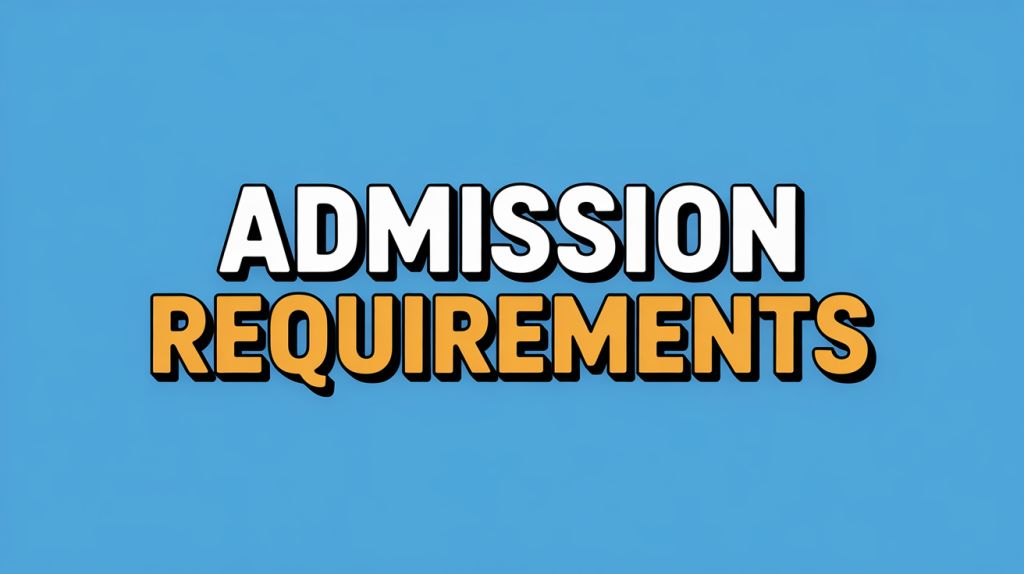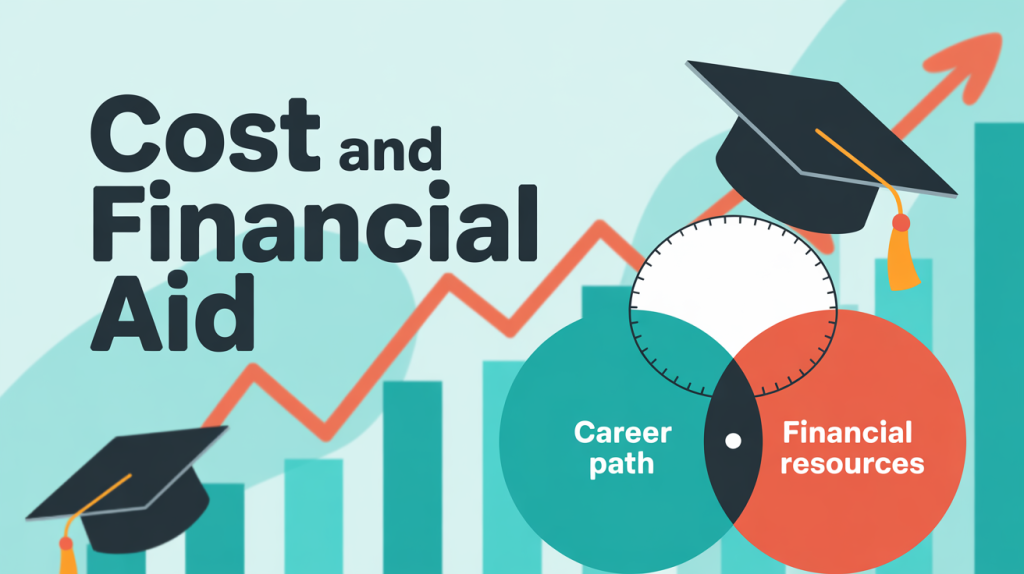Earn your online degree in mental health counseling from accredited programs to become a licensed counselor. Learn the steps, costs, and top schools—all in one place.
Choosing the right path to become a licensed mental health counselor can feel overwhelming—especially with so many online options. From confusing accreditation terms to unclear career outcomes, it’s easy to get lost before you even begin. The good news? You’re not alone—and this guide is designed to make things crystal clear.
Whether you’re switching careers or starting fresh, this article will walk you through everything you need to know: from picking a CACREP-accredited online program to understanding practicum requirements and future job prospects. Let’s break it all down step-by-step—no jargon, no guesswork.
What is a Mental Health Counseling Degree?

Understanding the Role of a Mental Health Counselor
A mental health counseling degree prepares you to help people manage emotional, behavioral, and mental challenges. Counselors support clients with stress, trauma, anxiety, depression, addiction, and relationship issues. These professionals listen, guide, and provide tools to improve mental well-being.
Mental health counselors work in many places, such as clinics, hospitals, private practices, and schools. They often use proven therapies like Cognitive Behavioral Therapy (CBT) and Person-Centered Therapy. With the rise in mental health awareness, demand for trained counselors is growing fast. In fact, the U.S. Bureau of Labor Statistics projects a 18% job growth for mental health counselors from 2022 to 2032 (source).
To work in this field, most states require a master’s degree in mental health counseling and state licensure. Some jobs also ask for experience or supervised clinical hours. You’ll learn how to assess clients, build treatment plans, and guide people toward better emotional health.
Counseling Psychology vs. Mental Health Counseling
While both fields support mental wellness, there are key differences. Counseling psychology focuses more on research and theory. It often leads to a Ph.D. and work in academic or research settings. Mental health counseling, on the other hand, is more practice-based. It trains students to work directly with clients in clinical settings.
Here’s a quick comparison:
| Area | Counseling Psychology | Mental Health Counseling |
|---|---|---|
| Degree Path | Ph.D. or Psy.D. | Master’s (e.g., M.A. or M.S.) |
| Focus | Research, theory | Clinical application |
| Career Settings | Universities, labs | Clinics, schools, private practice |
| Licensure Required | Yes | Yes |
| Time to Complete | 5–7 years | 2–3 years |
If you want to work closely with people in therapy sessions and get started sooner, mental health counseling is often the better fit.
Why Choose an Online Degree for Counseling?
Flexibility and Work-Life Balance
Online degrees in mental health counseling offer real flexibility for busy adults. You can study from anywhere, at any time. This is perfect for people with jobs, families, or other commitments. Many programs allow you to learn at your own pace, through video lectures, interactive forums, and digital assignments.
Unlike traditional campuses, online programs don’t require you to relocate or commute. You save time and money while still gaining a top-notch education. Some online degrees also offer part-time options, making it easier to balance your daily life with your career goals.
Even better, many programs now include virtual training tools and telehealth simulations to practice counseling techniques. As mental health services move online, having remote learning experience actually adds value.
Online vs. On-Campus Counseling Programs
It’s important to know how online and on-campus programs compare. Both can lead to licensure and solid careers. The key is to choose a program that is accredited and meets your state’s licensure rules.
Here’s how the two compare:
| Feature | Online Program | On-Campus Program |
|---|---|---|
| Flexibility | High (study anytime) | Fixed class schedules |
| Location | Remote (no relocation needed) | Must attend in person |
| Clinical Practicum | In-person or virtual placements | In-person only |
| Learning Style | Self-paced, digital | Instructor-led, face-to-face |
| Cost | Often lower overall | May include extra fees |
Today, many CACREP-accredited schools offer online counseling degrees that match campus quality. You just need to make sure the program includes supervised practicum and meets your state licensing board rules. You can check your state’s rules via the National Board for Certified Counselors (NBCC) website.
Curriculum and Course Structure
Core Subjects (Psychopathology, Ethics, etc.)
In a mental health counseling degree, you’ll study core topics that give you the tools to help others. Common courses include:
- Psychopathology – Understand mental disorders like anxiety, depression, PTSD.
- Counseling Theories – Learn how different approaches (CBT, humanistic, etc.) work.
- Ethics and Legal Issues – Know the laws and ethics of practice.
- Group Counseling – Manage therapy for multiple people at once.
- Cultural Competency – Work effectively with people from diverse backgrounds.
- Assessment and Diagnosis – Use tools to evaluate mental health issues.
- Developmental Psychology – Understand how people grow and change.
These courses build strong clinical skills and prepare you for real-world situations. Programs often include role-playing, discussion boards, and recorded mock sessions.
Practicum and Internship Requirements
Every accredited program includes hands-on experience. This means you’ll complete a practicum and an internship, often in your own city. These are supervised placements where you work with real clients under a licensed counselor.
Typical fieldwork includes:
- Practicum: 100–150 hours of observation and practice
- Internship: 600+ hours of supervised counseling
You’ll apply what you’ve learned in live settings like community clinics, schools, or hospitals. Some programs help you find local placements. Others require you to search on your own. Either way, fieldwork is key for building confidence and meeting licensure requirements.
Teletherapy and Online Client Training
As more clients seek care online, many programs now train students in teletherapy. This includes learning video session etiquette, managing digital records, and ensuring client privacy.
You’ll gain experience in:
- Conducting virtual intakes
- Using HIPAA-compliant platforms
- Addressing crisis situations remotely
This training prepares you for the future of counseling, where online therapy is becoming the norm. You can explore more about this shift at APA’s Telepsychology Guidelines.
Admission Requirements

Educational Background Needed
Most online mental health counseling degrees ask for a bachelor’s degree. It does not have to be in psychology, but having a related major like social work, human services, or education can help. Schools often look for a GPA of 2.75 or higher. Some competitive programs ask for a 3.0 or more.
Some programs also want to see your college transcripts, test scores (like the GRE, though many are now test-optional), and proof that you have taken certain courses. These courses may include:
- General psychology
- Human development
- Research methods
- Statistics
If you’re unsure whether you qualify, many universities offer free pre-application assessments. You can also check the school’s admission rules on their official website or through tools like GradSchools.com.
Letters of Recommendation and Statement of Purpose
You’ll need to submit 2–3 letters of recommendation. These should come from teachers, work supervisors, or counselors who know your academic or professional background. Their input shows how ready you are for graduate study and the counseling field.
You’ll also write a statement of purpose. This is a short essay, usually 500–750 words, where you explain:
- Why you want to become a counselor
- Why you chose this specific program
- How your background fits the field
- What goals you have after graduation
Some schools call this a “personal statement.” Use clear, honest language, and don’t just list your resume. Speak to your passion and experience. Many universities provide a guide on writing your SOP. For example, Purdue OWL offers helpful tips.
Accreditation and Licensing
Importance of CACREP Accreditation
Choosing a CACREP-accredited program is one of the most important steps in your journey. CACREP stands for the Council for Accreditation of Counseling and Related Educational Programs. It sets the top standards for counseling degrees in the U.S.
Graduating from a CACREP-accredited program makes it easier to:
- Get licensed in most states
- Qualify for national counselor exams like the NCE or NCMHCE
- Apply for federal jobs or military counseling roles
- Build employer trust and job security
Many states now require CACREP for licensure. You can search for accredited programs on the official CACREP website.
State Licensure Requirements After Graduation
To become a licensed counselor, you must meet your state’s licensing board rules. This usually includes:
- A master’s degree in counseling
- 600–1,000 hours of supervised internship
- 2,000–3,000 hours of post-degree supervised experience
- Passing a national exam (like the NCE or NCMHCE)
- Background check and application fee
Some states use extra tests or require more hours. Always check your local board’s rules at Counseling.org.
If you move states later, you might need to meet new rules or apply for a license transfer. This is called licensure by endorsement. Choosing a CACREP-accredited degree now can make this easier later.
Program Types and Duration
Full-time vs. Part-time Options
Online counseling programs let you pick between full-time and part-time study. Each has pros and cons.
- Full-time programs take about 2 to 2.5 years. You’ll study year-round and take 3 or more courses per term. This path works best if you can focus most of your time on school.
- Part-time programs are more flexible. You take fewer classes and finish in 3 to 4 years. This is great for working adults or parents balancing school with other tasks.
Some programs even offer custom plans where you adjust your pace. Just make sure you complete all coursework and clinical hours within the allowed time (usually 6 years max).
Accelerated Online Counseling Degrees
A few schools now offer accelerated options. These let you finish your master’s in 18 to 24 months. You’ll take classes year-round, often in 7–10 week terms. These fast-track programs are intense but perfect for people eager to start their careers quickly.
Look for schools that:
- Offer high support services like 24/7 tutoring and tech help
- Have clear course timelines
- Include practicum and internship scheduling help
- Still meet CACREP standards
Accelerated programs work well if you have a flexible schedule and can handle a faster pace. If you’re ready to dive in, check programs like Northwestern University’s online MA in Counseling or Wake Forest University’s online MA in Clinical Mental Health Counseling.
Cost and Financial Aid

Tuition Ranges (With Examples)
The cost of an online degree in mental health counseling varies by school, state, and length of study. On average, tuition ranges from $15,000 to $60,000 in total. Private schools often cost more than public ones, but they may offer more aid.
Here are examples of real tuition rates:
| University | Estimated Tuition (Full Program) |
|---|---|
| University of the Cumberlands | $24,000 |
| Adams State University (CO) | $22,000 |
| Wake Forest University | $58,000 |
| Southern New Hampshire University | $28,000 |
| Liberty University | $29,000 |
Note that some schools charge by credit hour, while others offer flat-rate pricing. Always check if the cost includes fees, books, and practicum supervision. You can often find this info on the school’s financial aid page or by contacting admissions.
Scholarships, Grants, and Loan Options
Many students use federal or private aid to lower their costs. You can apply for FAFSA (Free Application for Federal Student Aid) to get access to loans and grants (FAFSA official site). Most accredited schools accept federal aid.
Other options include:
- University Scholarships – Based on GPA, background, or goals
- Graduate Assistantships – Some schools offer small teaching roles
- Private Scholarships – From groups like the American Counseling Association (ACA) or NBCC Foundation
- Employer Tuition Reimbursement – If you’re already working in healthcare or education
Check sites like Fastweb and Scholarships.com to find more funding sources. Also ask if your school offers payment plans that let you pay over time.
Career Paths After Graduation
Licensed Professional Counselor (LPC)
One of the top goals for graduates is to become a Licensed Professional Counselor (LPC). To do this, you must:
- Earn a master’s in counseling
- Complete your practicum and internship
- Pass the National Counselor Examination (NCE)
- Fulfill supervised post-graduate hours
- Apply through your state’s licensing board
As an LPC, you can work in mental health clinics, hospitals, schools, private practice, or even start your own business. You help clients with stress, anxiety, addiction, grief, and more.
School Counselor or Substance Abuse Counselor
Some graduates go on to become school counselors, helping students with personal, academic, and social growth. To work in schools, you may need extra certification depending on your state.
Others specialize as substance abuse or addiction counselors. This work focuses on helping people overcome drug or alcohol dependence. You can work in rehab centers, nonprofits, or correctional facilities.
Both paths need strong communication skills, compassion, and state licensure. The U.S. Bureau of Labor Statistics shows that substance abuse counselors earn a median salary of $49,710 per year, while school counselors earn around $61,710 per year (source).
Job Outlook and Salary Expectations
The job outlook is strong. Counseling jobs are growing faster than average, with an 18% projected growth from 2022 to 2032. This is much higher than many other fields.
Expected salaries depend on your role and location. Here’s a quick guide:
| Career Type | Average Salary (U.S.) |
|---|---|
| Licensed Professional Counselor | $55,000–$70,000 |
| School Counselor | $60,000–$65,000 |
| Addiction Counselor | $45,000–$60,000 |
| Private Practice Counselor | $70,000+ (varies) |
For more detailed figures by state, visit O*NET OnLine or the BLS occupational database.
Best Online Counseling Programs
Top CACREP-Accredited Universities
Choosing the right school matters. These schools offer CACREP-accredited online programs, meaning they meet high standards and prepare you for licensure.
Here are some top-rated options:
| University | Program Title |
|---|---|
| Wake Forest University | M.A. in Clinical Mental Health Counseling |
| Northwestern University | M.A. in Counseling |
| University of the Cumberlands | M.A. in Clinical Mental Health Counseling |
| Liberty University | M.A. in Professional Counseling |
| Adams State University | M.A. in Clinical Mental Health Counseling |
Each of these schools offers flexible formats, online support, and field placement help. Many have year-round start dates, so you can begin when ready.
Rankings Based on Flexibility, Cost, and Career Support
To rank these schools, consider three key areas:
- Flexibility – Can you choose part-time or self-paced study?
- Cost – Are tuition and fees reasonable?
- Career Services – Does the school help with licensure and job placement?
For example:
- Liberty University offers low tuition and strong online tools.
- Wake Forest has high job placement rates and live video classes.
- Adams State is budget-friendly and great for Colorado residents.
You can explore more options using U.S. News & World Report’s Best Online Graduate Counseling Programs.
Here are the final parts of your article on online degree in mental health counseling:
FAQs – People Also Ask
Is an online mental health counseling degree respected?
Yes. As long as the program is CACREP-accredited and meets state licensing rules, an online degree is just as respected as a campus-based one.
Can I become a licensed counselor through an online degree?
Absolutely. Many online degrees include the required clinical hours and practicum needed for licensure. Always check your state’s licensure board to confirm.
How long does an online master’s in counseling take?
Most programs take 2 to 3 years full-time. Some offer accelerated options (18–24 months), while others allow part-time study (3–4 years).
What are the cheapest online mental health programs?
Public universities like Adams State University or University of the Cumberlands offer quality degrees for under $25,000. Always compare costs and financial aid options.
What does CACREP accreditation mean for online degrees?
It means the program meets national counseling education standards. Most states require CACREP for licensure. It also boosts your chances of passing licensure exams.
Is clinical practicum required for online counseling programs?
Yes. All accredited programs include in-person fieldwork like practicum and internship. These are required for graduation and licensure
Final Thoughts – Is This Degree Right for You?
If you want to help people and make a real difference, a mental health counseling degree is a great choice. With online learning, you don’t need to move, quit your job, or wait for the perfect time. These programs are built to fit your life.
The key is picking a CACREP-accredited school and making sure the program matches your state’s licensing rules. Whether you’re aiming to work in a clinic, school, or private practice, this path gives you the tools to succeed.
Take time to compare programs, ask questions, and plan your next move. Your journey to becoming a licensed counselor can start today—with just one click.